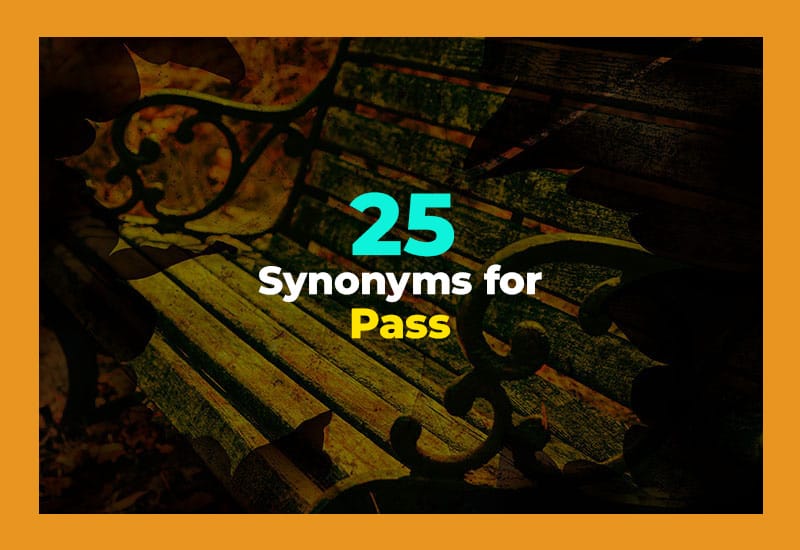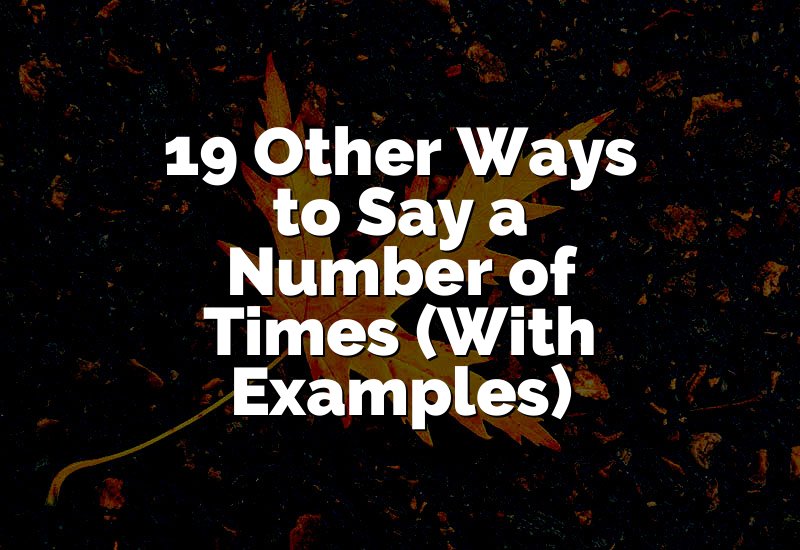You know how sometimes you want to say “pass,” but you feel like using a fresher word? Well, lucky you, there are plenty of options. You can say “skip,” “go by,” or even “move past.” Each one brings its own flavor, and it’s fun to mix them up. In this article, we will explore 25 different ways to say PASS, with meanings and easy examples.
| Synonym | Meaning | Example |
|---|---|---|
| Skip | To not do something on purpose | I will skip dessert tonight. |
| Go by | To move past or travel near | We watched the train go by. |
| Move past | To continue forward and leave something behind | She moved past her mistake. |
| Cross | To travel from one side to the other | He crossed the street quickly. |
| Get through | To succeed in finishing or surviving something | She got through the hard exam. |
| Overlook | To choose not to notice something | He overlooked the small error. |
| Walk by | To pass while walking | I saw her walk by my house. |
| Glide | To move smoothly past something | The swan glided across the lake. |
| Flow | To move like a stream past an area | The river flows under the bridge. |
| Drift | To move slowly past without control | The boat drifted near the shore. |
| Bypass | To avoid or go around something | They bypassed the traffic jam. |
| Step aside | To move to the side and let pass | He stepped aside for the old man. |
| Hand over | To give something to another person | Please hand over your ticket. |
| Advance | To move forward to the next stage | The player advanced to the final round. |
| Relay | To pass something along to someone else | She relayed the message to her friend. |
| Transfer | To give or move something to another place | He transferred money to his brother. |
| Yield | To allow someone else to go first | The car yielded at the sign. |
| Give up | To stop trying or let go | He gave up his seat for her. |
| Let go | To release something from your hold | She let go of the balloon. |
| Move along | To continue going forward | The police asked people to move along. |
| Push forward | To keep going despite challenges | He pushed forward with his plans. |
| Carry on | To continue with an action | She carried on with her story. |
| Keep going | To not stop and continue | They kept going until they reached home. |
| Send | To make something go from one person to another | She sent a letter to her friend. |
| Progress | To go forward in growth or steps | He progressed in his career slowly. |
Skip
When you use “skip,” it means you are choosing not to do something. You are avoiding it by your own choice. People use it when they decide to leave something out, like a meal or a meeting. It is casual and common in daily talk. You can use it for both big and small things in life. It shows choice and intention, not accident.
- I decided to skip the gym today.
- She will skip breakfast this morning.
- They skipped the boring meeting.
Go by
The phrase “go by” means moving past something or someone. It is often used when talking about time, vehicles, or people. For example, you can say a bus goes by your house every morning. It gives the feeling of something moving without stopping for long. It is easy to use in daily conversations. It usually describes something passing in a natural way.
- We watched the car go by.
- The years go by so quickly.
- He let the chance go by.
Move past
When you “move past,” you are leaving something behind and continuing ahead. It often refers to challenges, memories, or mistakes. Using it means you are not stuck anymore. Instead, you are going forward. It can be used for both physical movement and emotional growth. It sounds hopeful and strong, showing courage to keep moving in life.
- She moved past her childhood fears.
- He moved past the accident quickly.
- They moved past their fight and smiled.
Cross
To “cross” means to go from one side to another. It could be a street, a bridge, or even a border. People often use it when they are physically moving through a space. It can also be used in a deeper way, like crossing into new stages of life. It brings the image of travel, movement, and reaching the other side.
- He crossed the busy road carefully.
- They crossed the river with a boat.
- She crossed into a new phase in life.
Get through
“Get through” means successfully finishing something hard or moving past difficulties. It is used when talking about exams, jobs, or hard times in life. It gives hope and relief. You can say you get through traffic or a stressful day. It feels supportive and positive. People often use it when encouraging others to stay strong and finish.
- She got through the tough exam.
- We got through the long winter.
- He got through a tiring week.
Overlook
To “overlook” means to ignore or not pay attention to something. Sometimes people overlook by mistake, but often it is by choice. It can also mean forgiving small errors or not focusing on small details. This word gives a sense of letting things pass without care. It is soft and gentle in tone, showing kindness or forgetfulness.
- She overlooked the small spelling error.
- He overlooked his friend’s late arrival.
- The teacher overlooked the tiny mistake.
Walk by
“Walk by” means moving past while walking. It is simple and easy to use. You often hear it when someone notices another person passing them. It gives a clear image of movement. You can use it for real life, like on streets or in parks. It shows a casual moment of someone walking near you without stopping.
- I saw her walk by quickly.
- He walked by without noticing me.
- They watched people walk by the shop.
Glide
To “glide” means to move smoothly and quietly past something. It is often used for birds, swans, or skaters. The word creates a soft and graceful image. It feels light and peaceful, not rushed. People love to use it when describing beauty in movement. It shows elegance and calmness. It is not about speed, but about smoothness and ease.
- The swan glided across the pond.
- She glided past the crowd with grace.
- The skater glided across the ice.
Flow
When you “flow,” you move like water, smooth and steady. It usually describes rivers, streams, or even time. Flow gives the sense of constant, unstoppable movement. It feels natural and free. People also use it for progress, energy, or ideas. It paints a picture of movement without effort. It is soft, poetic, and easy to understand.
- The river flows under the old bridge.
- Ideas flowed as they talked together.
- Time flows quickly when you are happy.
Drift
To “drift” means to move slowly without control, like on water or in the air. It shows movement that is soft and unplanned. Boats, clouds, and even thoughts can drift. People use it when something is moving gently away or past. It feels calm, sometimes dreamy. It suggests being carried by outside forces instead of choice.
- The boat drifted near the shore.
- Clouds drifted across the sky.
- His mind drifted during class.
Bypass
To “bypass” means to avoid something by going around it. People often use it for roads, traffic, or even rules. It shows smart action to save time or trouble. Instead of stopping or facing something directly, you find another way. It can also mean skipping over steps. It gives the feeling of being quick and clever.
- We bypassed the heavy traffic.
- He bypassed the broken bridge.
- She bypassed the long waiting line.
Step aside
“Step aside” means to move out of the way to let someone else go through. It is often polite and respectful. It is a small action, but it makes a big difference. People step aside for others who need space or help. It shows kindness and good manners. It can also mean giving someone else a chance.
- He stepped aside for the old man.
- She stepped aside to let the kids pass.
- They stepped aside for the police car.
Hand over
To “hand over” means to give something to another person directly. It is a clear act of passing from one person to another. People often use it for tickets, money, or documents. It shows responsibility and trust. It can be formal or casual. This word is common in daily life whenever you give something with your hands.
- Please hand over your homework.
- He handed over the money carefully.
- She handed over the keys to him.
Advance
To “advance” means to move forward, either in position or stage. People use it in sports, jobs, or personal growth. It has a strong and positive tone. It shows progress and success. Instead of just moving, it means moving with purpose. You can advance to the next level, round, or step. It sounds active and confident.
- The player advanced to the finals.
- She advanced in her career slowly.
- He advanced to the next stage of learning.
Relay
To “relay” means to pass something along to another person. It can be information, a message, or even a baton in a race. It shows teamwork and sharing. People often use it when transferring news from one person to another. It is about moving something forward through people. It is useful, active, and clear in meaning.
- She relayed the message to him.
- They relayed the news to the team.
- He relayed the baton in the race.
Transfer
“Transfer” means to move or give something from one place or person to another. It is very common in schools, jobs, or banks. People often transfer money or move to another school. It shows a clear change of place or holder. It can be physical or digital. It is often formal but also easy to use daily.
- He transferred money to his sister.
- She transferred to another college.
- They transferred the files safely.
Yield
To “yield” means to let someone else go first or take the turn. You often see it in driving, but it can also be in daily life. Yielding shows respect and patience. It is about slowing down and allowing others to move before you. It is kind and polite, but sometimes it is also about following rules.
- The car yielded at the stop sign.
- He yielded to the older woman.
- They yielded their seats to children.
Give up
To “give up” means to stop trying or to let go of something. People use it when they are too tired or decide to stop. It can be about objects, habits, or efforts. Sometimes it shows weakness, but other times it shows kindness. It is common in real life and easy to say. It brings both sadness and relief.
- He gave up the fight quickly.
- She gave up her seat for the man.
- They gave up the old house.
Let go
“Let go” means to release something from your hand or heart. It can be real, like letting go of a rope, or emotional, like letting go of bad memories. It shows freedom and moving forward. It is gentle but strong. People often use it when they are ready to move past something. It is about peace and release.
- She let go of the balloon.
- He let go of his anger.
- They let go of old grudges.
Move along
To “move along” means to keep going forward without staying in one place. It is often used by police or guards to ask people not to stop. But it can also mean continuing in life. It gives the idea of progress and no delays. It sounds like encouragement to not waste time standing still.
- The police told people to move along.
- She moved along after her breakup.
- They moved along to the next stage.
Push forward
“Push forward” means to keep going despite problems. It is about strength and not giving up. People use it in jobs, life goals, or hard times. It feels strong and inspiring. It shows energy and determination. When you push forward, you do not let challenges stop you. It is about moving ahead with courage.
- He pushed forward with his work.
- She pushed forward despite failures.
- They pushed forward to reach success.
Carry on
To “carry on” means to keep doing something without stopping. People often use it when facing problems but still continuing. It gives a sense of bravery and endurance. It is encouraging and supportive. It can be used for work, daily tasks, or personal journeys. It shows a spirit of not stopping and staying strong.
- She carried on with her story.
- He carried on with his studies.
- They carried on after the loss.
Keep going
“Keep going” is a friendly and motivating phrase. It means do not stop, just continue. People often use it to cheer up others. It is simple but powerful. It is full of encouragement and positivity. It can be about small tasks or big dreams. It shows belief in moving forward no matter what comes your way.
- He kept going despite being tired.
- She kept going with her running.
- They kept going until they reached home.
Send
To “send” means to make something go from one person to another. It can be a letter, a message, or even a gift. It is part of daily life. Sending is all about giving across distance. It shows action and connection between people. It is fast, direct, and very useful. It keeps relationships alive and strong.
- She sent a gift to her friend.
- He sent a letter to his family.
- They sent flowers to her office.
Progress
To “progress” means to move forward in growth, work, or steps. It is a positive word that shows improvement. People use it for personal growth, education, or careers. It gives a sense of moving up and not staying the same. Progress is often slow but steady. It is about better results and moving ahead in life.
- He progressed in his studies well.
- She progressed in her career steadily.
- They progressed in building their house.

Final Thoughts
Words are powerful, and using different ways to say PASS can make your talk more fun and rich. Each synonym has its own feeling, whether calm, strong, or polite. By trying these, you add color to your conversations. You also keep your words fresh. So, mix them into your daily talk and enjoy the flow of variety.









